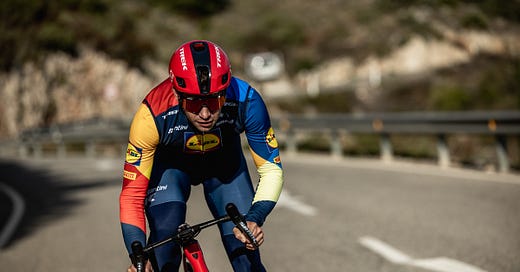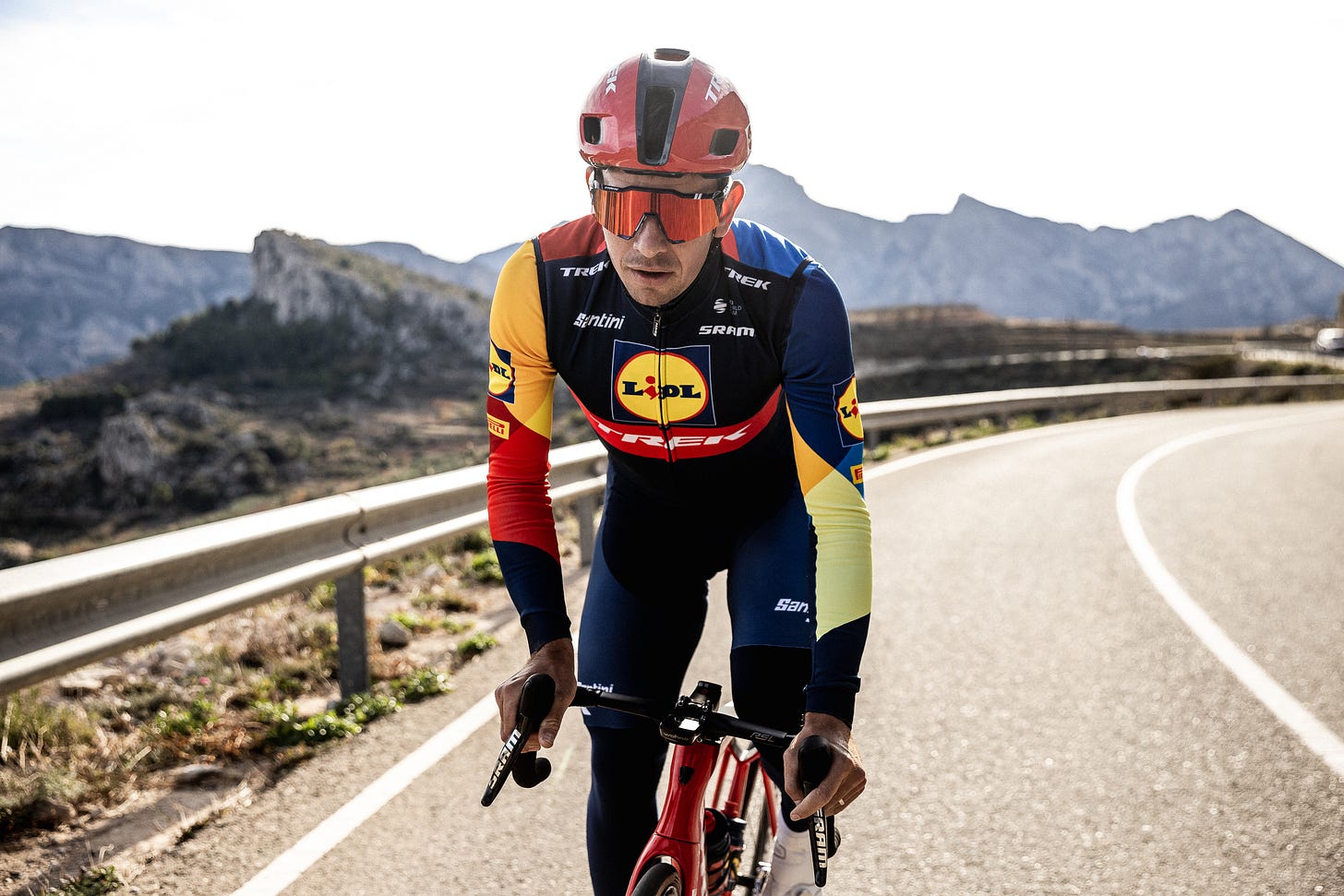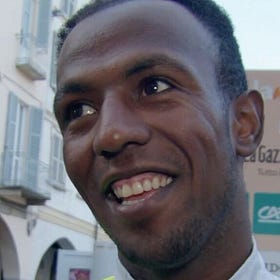Ryan Gibbons Interview - Mads Pedersen's Tour de France 'right-hand man'
Gibbons speaks to Global Peloton about Lidl Trek's fight for Tour stage wins, working with Pedersen and representing South Africa
Ryan Gibbons will start his second Tour de France when the peloton rolls out of Florence on Saturday. The South African has the responsibility of supporting one of the favourites for the green jersey, Mads Pedersen.
The day before he left for the Tour, the Lidl-Trek man spoke to Global Peloton about the team’s goals for the race, working with Pedersen, giving up leadership ambitions and representing South African on the biggest stage of them all.
Lidl-Trek come into the Tour with a clear leader for the flatter stages in Mads Pedersen. What are the team’s goals for the race and what’s your role within that?
As a team, our objective is to go for stages, that's pretty clear, with Mads on the sprint stages and the medium mountain stages, and then [Giulio] Ciccone on the mountain days. We believe in Mads. Mads is a very dynamic, versatile rider. He's one of the best in the world. Not the best sprinter in the world per se, but he can win a bunch of sprints. He generally focuses on the harder days. So our goal is to ride for him on all the flat sprint stages and then also the medium days, even like stage one, to just go for it.
My job is to be his right-hand man, to lead him out, to be there in all the sprint stages and on the harder days to try and be there as long as I can. I think he typically climbs a lot better than all the other sprinters. On my day, I can kind of tag along with him for a while. So the plan is when it's a reduced group peloton of 60, 65 odd riders to hopefully have both of us still be there. Easier said than done, of course. And yeah, I think to go for as many stages as possible with him and then see where we are with the green jersey, because he's the kind of guy who can get in breaks in the mountain days, pick up points on pretty much every stage.
We saw at the Dauphiné that you and Mads have become a strong unit. What's he like to work with and how have you developed that partnership?
It's been pretty good. We haven't had that many opportunities this year. We have ridden and done a lot of race days together, but kind of pure sprints and lead outs, we haven't had that many chances. But the chances we have had, we've done pretty well. We got second in a stage at Paris-Nice. It was a decent lead out there and he did well. Dauphiné, again, you know, not the strongest sprint field, but we were able to pull off a win, which is always good for the confidence. And then hopefully going to repeat that at the Tour.
I've done training camps with him where it's just been him and I. He's such an easy guy to work for. He's a leader. He knows how to motivate you. He knows how to uplift you, but he's also one of those sprinters that never gives up. You often see sprinters when they see they're not going to win, they sit up. Or, there's three guys up the road and they're not going to kill themselves for fourth. Mads will always give his utmost best and he will take any result he can, whether it be sprinting for 1st or 5th or 25th. He will not give up until the line and that just motivates you as a lead out rider, because you know that he will always fight until the very end. It makes you want to do your best because you know he's going to do his best no matter what. A lot of riders I've ridden for in the past, if they see they're not going to win, you know, they give up. It's hard to risk your life and give your all when you're not even sure the person you're riding for is going to do the same.
He's a charismatic leader. He's a good motivator. He's a child at heart. If you were to overhear some discussions on the dinner table or in the peloton, you know, you'd think very poorly of us. But he's a great guy, a good friend, but very easy to work for. Everyone in the team is happy to ride for him because you know he's one of the best riders and he'll always give his best.
You have a role to play within Lidl-Trek, but do you have any personal goals within the race?
I am still a little bit ambitious. I think as a professional sportsman you have to be to still be competitive and still be there. But my role is very clear and my job description and it's to support Mads. If a situation arises, if I manage to get into a breakaway on a day that he's maybe not feeling great or isn't there, I'll go for it. Or if I make it to a final where he's not there…I think that would never happen because if that was a situation, I would naturally wait, and he's a better climber than me, so he wouldn't be in that position anyway.
I don't have any of my own ambitions or kind of objectives. Mine is just to be as good as I can be for him. Because me on my best day, I can maybe get a podium on a stage, but him on his best day, he can win multiple stages so that beats anything. If I can play a role in that and add value, that's the main objective. My job is just to be there when he needs me and hopefully make it to Nice.
You started off the first few years of your career as one of the leaders at Dimension Data and you've transitioned in the last couple of years into this lead out role. Was that a decision you consciously made, or something that has just happened at the demand of the teams you've ridden for?
I think what I saw for myself in Dimension Data, I think I was obtaining my best results then - well, if you compare it to the last few years. I had a lot of freedom there, but in order to win at the highest level, unless you're a super talent, you need support and you need a lead-out. You need a team around you, not just one guy, but a few guys who are dedicated and designated to you. And unfortunately, in Dimension Data, we didn't have that depth and also, I wasn't a good enough rider to warrant that.
So I realised it was not going to happen on the big scale and at WorldTour events without that support. I also hadn't won enough races to kind of speak to the team boss and say, ‘listen, guys, I need a lead-out’. So the next step was to become a lead-out rider.
And with UAE, over the years, with the successes of Pogi, they never really were a sprint-focused team. So I went as a support rider there, but it was almost like my role was ambiguous because I'm a sprinter-type rider in a team that's GC-focused and orientated.
So the next step was to leave a team like that and go into a team that's classics and sprint-orientated, and that just happened to fall into place here. Numbers-wise, I've always had really, really good numbers. It doesn't really show that on the results sheet, but I'm just glad that some teams could see that and believe in that and put me to good use.
What has that transition been like for you personally?
It is challenging. Obviously, you want to win. You grow up wanting to get better and better and make it to the professional ranks, and then you want to win at those ranks. But I think as I got older, I became more realistic, and unless you're winning 10 bike races a year, you can't ask for that freedom or you can't expect that you're going to every year have a contract and remain in the sport if you're not doing that. So if you're not winning those 10 races a year, I think the best thing to do is to find a way in which you can help a teammate do that.
Getting out and training and hurting yourself and dragging your body through the mountains on the rainy days and things like that, you aren't just doing it for a paycheck. You've got to be doing it because there's a reason. Now, I'm part of a lead-out. I'm part of a bigger story.
Before it was just kind of, we're going to select eight riders, go to a race, see what you guys can do. It's hard because it is ambiguous. Maybe you are a little bit motivated and the team try and say, oh, this is a good stage for you, but there's no real strategy and realistically, you've got a 1% chance of pulling it off.
But here; you've got structure, you've got support, you've got belief, you've got a well-oiled machine, it's methodical. It just makes it a little bit easier. If you told 22-year-old Ryan that I'd be where I am now, I'd probably be a little bit like, ‘oh, that's a bit shitty’. But experiencing what I have, and the sport is so competitive, it's so cutthroat and to be realistic, I wasn't able to cut it.
I'm just really happy that I can be on one of the biggest teams in the world riding as a right-hand man for probably one of the best riders in the world. So if I look at it now, more maturely, holistically, I'm pretty chuffed. But I definitely had to put my own ambitions and my own career objectives to bed over the years.
You've just joined Lidl-Trek this season, tell me what it's like to be part of the team and how it differs from other teams you've been with.
It's going to sound very cliché, and people always say this when they join a new team…It's like, oh, it's an amazing family…but that truly is what Lidl-Trek is. They care about you as a person before they care about you as an athlete. This year, I struggled in the classics. I got quite sick. In previous teams the attitude was, well, you're not dying and you're okay. You can just start the next race or just have a paracetamol and suck it up. The team were like, man, we can see you're not at your best. We can see you're mentally taking a knock. Take six weeks off.
So in the middle of March, I flew back to South Africa and that was that. And it was not like now we're going to change your program and now we don't believe in you and now you've let us down. It was, are you okay? We know what you're capable of. We're not seeing it. So if there's something wrong, get better. I've never experienced that before. It's always been if the rider's not performing or the rider's sick, it's his fault. My coach called me to take ownership. My doctor called me to apologise. Directors are like don't worry, your program's going to remain as it is. We'll do the Tour, just make sure you're okay. So that's just such a special thing. It's something I'm not used to where the team care about you as a person and your mental health and how things are going.
My previous team, UAE, was obviously the number one team in the world. But it was a machine and it was done one way and that was it. Where Trek are more open and they're open to discussion and communication and ideas. The women's team in UAE, we never had any contact with them. We did one photo with them at a training camp, but we didn't even stay in the same hotel. With Trek, we're very much with the women's team and we integrate more. It's kind of an overlap with staff. It just feels like it's more familiar and it's more relaxed and comforting.
So I'm really, really happy. I don't see myself leaving a team like this. As long as they believe in me and like me, I can definitely see myself retiring from this team.
You're going to the Tour for the second time in your career. Describe that feeling to me when you get the call up.
In my mind, a Grand Tour is a Grand Tour. I've done four Giros and two Vueltas. The Tour, of course, is the pinnacle of the sport. It's the biggest event. And to say you've done it once I think is a big deal. I know a lot of riders, they get their race program at training camp in December and it's like, am I doing the Tour? Or you speak to fans or your family and the first question they ask, whether it be in January or whenever, it's like, are you doing the Tour de France? Did you do it?
For me, it wasn't really the be all and end all. I'm grateful I've done it in the past, but if I'd never done it again, it wouldn't have really changed my life too much. I wanted to know that I could add value and I could do something. So if you'd said to me, ‘Ryan, you're not going to ever do a Grand Tour, but you'll do other races that you could maybe potentially win or you and Mads can go and do 20 sprints’, I'd be more happy with that.
Having said that, the Tour is the Tour. And I think it's always an honour and a privilege to do it and to be kind of on that initial long list. It is special.
It had been mentioned to me that I'd be with Mads. So wherever Mads goes, I go. And he goes to the Tour, so I go to the Tour. But anything can happen, illnesses…it's not quite set in stone until they announce it. But when they did, it's almost that sigh of relief. Like, OK, I told my family and friends and everyone that I'm doing the Tour. I don't want to be that guy who said he was doing the Tour. He must be shit if the team didn't select him. So he's obviously not good enough. It's more that relief.
22-year-old me would have been a bit nervous. But now it's just, OK, it's another day of work. And let's make it count.
It’s your second time at the Tour with the national champion’s jersey as well. What does that mean to you to be able to represent South Africa at the Tour in that way?
It is truly special. As you just mentioned, I've done multiple Grand Tours, but I think the only Grand Tours I've ever done in the National Champs’ jersey has been the Tour. It just means a lot. You are easily noticeable. People are able to spot you out. A bit of pressure, but you kind of have that extra motivation. Every time you look down, you're representing your nation. It gives you that extra push.
You always see South African flags along the road, they just elevate you and it's pretty special. So, yeah, to have that jersey again at the biggest race in the world, I'm very proud and I hopefully can inspire some South Africans and young upcoming riders to show them that it's possible.
It’s a nation that's not really known for their cycling, even as an upcoming rider or as a South African it's not really a sport that you believe you can turn professional and get to the highest level and then race abroad. But it is possible. And if I can motivate and inspire some young South Africans and even Africans, that's pretty cool.
If a few more people add paid subscriptions to Global Peloton I will be able to share more stories of global professional cycling. If you can afford it, please consider adding a paid subscription.
Latest paid post:
'It's not easy to handle' - Biniam Girmay opens up about the pressures of expectation
Ever since that famous March afternoon in 2022, when Biniam Girmay held hands aloft becoming the first black rider to win a classic at Gent-Wevelgem, the cycling world has expected great things from the Eritrean. Not least his Eritrean fans, who follow him to every race, hoping for a glimpse of greatness.
Thanks for reading Global Peloton!
The best way to support Global Peloton is to add a paid subscription. Your subscription enables me to bring you more international cycling news and stories.
If you enjoyed this post, please consider subscribing and sharing.
Or, you can Buy Me a Coffee






